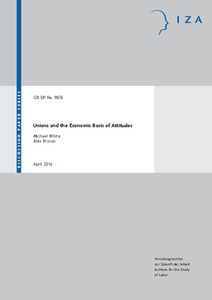Unions and the economic basis of attitudes
"Unions make differences to employee satisfaction that correspond to their effects on individual economic advantage. Panel data reveal how changes in economic circumstance and changes in job satisfaction are linked to changes in union coverage. When individuals move into a union covered job the...
| Main Authors: | , |
|---|---|
| Institution: | ETUI-European Trade Union Institute |
| Format: | TEXT |
| Language: | English |
| Published: |
Bonn
2016
IZA |
| Subjects: | |
| Online Access: | https://www.labourline.org/KENTIKA-19104787124919229699-unions-and-the-economic-basis-.htm |
| Summary: | "Unions make differences to employee satisfaction that correspond to their effects on individual economic advantage. Panel data reveal how changes in economic circumstance and changes in job satisfaction are linked to changes in union coverage. When individuals move into a union covered job they receive a wage mark-up and express enhanced pay satisfaction. Conversely, those moving from a union covered job on average lose any mark-up and have significantly reduced satisfaction. Similar findings emerge for working hours. On average individuals prefer shorter hours, something they tend to (not to) achieve on moving into (out of) a unionized job, resulting in higher (lower) satisfaction. Switching into union coverage lowers satisfaction with job security, even though coverage has no effect on the risk of unemployment. This is because covered employees suffer greater costs of re-employment for a given level of unemployment risk, partly due to loss of the union mark-up." |
|---|---|
| Physical Description: | 42 p. Digital |

